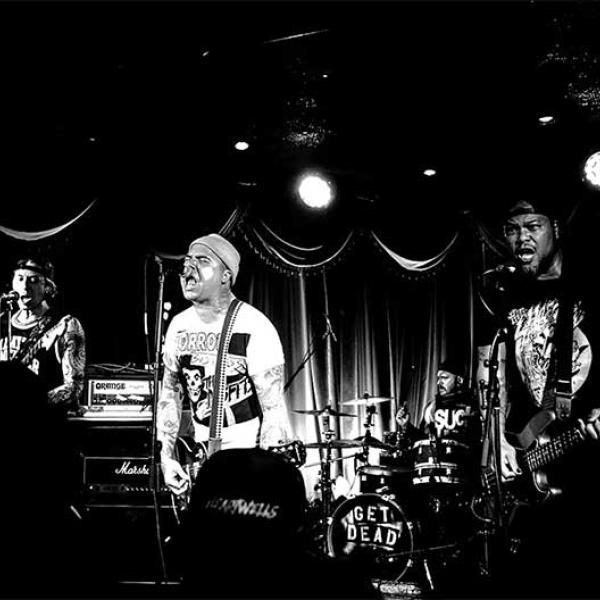Upcoming Releases

MakeWar is back with their new album, A Paradoxical Theory of Change, which will be released on June 28th! This album delves deep into themes of reinvention, self-belief, and the strength of vulnerability, making it their most personal record yet. Want a taste? Listen to the powerful track “Tell Me” below.
Vocalist and guitarist Jose Prieto shares: "'Tell Me' is about the catharsis of giving up or giving in—when you've had enough. You’re sick of fighting for something to change, just to stay where you are. Sick of fighting for a different outcome, so you surrender. But with this surrender, you become free. You grow, accept, and change. This track is the lead single from our brand-new album, 'A Paradoxical Theory of Change,' for a reason. MakeWar has never been about giving up; instead, we've always fought to liberate ourselves from imagined prisons. In 'Tell Me' and throughout 'APTOC,' you will see and hear MakeWar's vulnerability and growth in ways never before seen. This record is the most quintessentially MakeWar yet paradoxically different. We hope you enjoy 'Tell Me,' and we can't wait to share the rest with y’all."
For most bands, making music is therapy. It’s a cliché, but clichés are clichés for a reason—because they’re usually true. It’s fair to say that that was the same for MakeWar, too. Formed out of the ashes of frontman Jose Prieto’s solo endeavor, Sad And French, the Brooklyn trio—completed by bassist Edwin Santacruz, and new drummer Alejandro Serritiello—have always worn their hearts on their sleeves. Heartbreak, despair, and alcohol have long been at the center of those struggles, and the songs themselves are a way to push through all of that. Whether it was 2015’s eponymous record—full band reinventions and re-recordings of Sad And French songs—2016’s first album proper, Developing A Theory Of Integrity, or 2019’s Get It Together, MakeWar’s albums have all been intensely cathartic affairs that bristle with the promise and the terror of the human experience. In other words: they’re therapy. It still sounds like that’s the case on A Paradoxical Theory Of Change. Perhaps more than ever, in fact. But it’s not. Because for the last three years or so, Prieto has been undergoing actual therapy—which is where a lot of the ideas on the record stem from. “Developing A Theory Of Integrity was very party-involved,” he explains. “We made it when we were very young and it’s all about drinking your problems away. But A Paradoxical Theory Of Change talks about how if you really want or need change in your life, instead of fighting or pushing against whatever it is that you’re feeling, you should absorb it, accept it and let it be. It’s there for a reason, and once you acknowledge that you’re living with this problem, you can actually mold it. You have to let it be and not fuck with it so you can finally find change.”
In many ways, that’s the total opposite of MakeWar’s initial purpose. As the name suggests, the band was started as a way for Prieto to, as he puts it, “literally fight all these problems that I had in my head, all this depression and anxiety.” MakeWar was, he says, a way for him to push all that out. Now, though, he’s going about it in a very different way. “It’s still a war and a fight,” he clarifies, “but I’m being more intelligent in terms of how to do it. I’m still struggling, as you can hear on the record, but I’ve found the key to battling it.” That much is clear from the moment opener “Magic Worlds” kicks the record off. It begins almost tentatively, almost as if the song is giving the anxieties and traumas that inspired it room to breathe for a bit, to makes themselves known before the band pushes back. When they do, it’s with a formidable statement of intent, of acceptance, of action through temporary inaction. ‘It’s been a long time since the last time I felt like this,’ sings Prieto. ‘I’m not crazy, it’s the sequel of all my fears/Sooner or later, I might have to step aside/And try to relearn how to live on with my life.’ That’s exactly what the rest of the song—and the eleven that follow it—do. They don’t just forge a new path forward, but also drag the past (and all of its mistakes) into the present to be dealt with, too. As such, there’s a great deal of self-reflection, of existential reconciliation, of using that key to lock or unlock whatever doors are necessary to move forward. As Prieto sings at the end of that first track: ‘I can’t remember the last time/I could just get on with my life.’
In stark comparison to Get It Together—which was very much about a (pre-pandemic) world and society in decline and was commenting outwards on that—these 12 songs look inwards. And although Prieto might not need these songs to wrestle his demons in the same way, they they’re as uncompromising and emotionally intense as ever. Just listen to the way his voice cracks on the jittery melodic punk of “Underachiever”, the raucous melancholy of “Tell Me” and its insanely catchy chorus of defiance and hope, and then the keep-you-head-above-water anthem of “P.A.N.”, which addresses Prieto being diagnosed with Hashimoto's disease, but also captures the pain and frustration of a life in stagnation. Elsewhere, there’s “Goodbye To All That”, a beautiful ode to New York that’s also about wanting to leave it, to which his partner Lily contributed some of the lyrics. Most of this record was written during the height of the pandemic by Prieto at home on his acoustic guitar. In that sense, it not only lent itself naturally to personal introspection and self-reflection, but also recalled the early days of Sad And French. It was then fleshed out and recorded in a continuous two-week period at Sonic Ranch studio in El Paso, Texas with longtime friend of the band Marcel Fernandez. It was a recording experience unlike anything the band had experienced before.
“It was two weeks of pure insanity and intensity,” remembers the singer, “which I feel is good for this record, because you can kind of see it and hear it. There was a pool there and some hikes that we could have gone on, and we never even went in the pool once. We just got up, ate breakfast, went to the studio, ate lunch, went back to the studio, ate dinner, went back to the studio. We went to bed at like 6 or 7am every day and got up at like noon every day. It felt like The Truman Show because we were just doing the same things. And there are no clouds in the Texas sky anywhere at any time of the day. There were times when I walked outside because I was getting sick of the studio and I started to feel claustrophobic outside, and I was just like ‘What the fuck?’”
Bizarrely, that mirrored how Prieto had felt when he was writing these songs, although that was in the concrete confines of New York City rather than beneath the vast skies of El Paso. Regardless, it makes these songs feel all that more real. Indeed, final song “This Fucking Year” is a powerful lament written about the first twelve months of the pandemic, but which could apply to anyone at anytime and anywhere. That’s the magic of this record—it’s specific and universal, working both as a memory of universal trauma as well as something much more personal, the two layered up on top of each other until the difference between them is obscured. The brief hidden track at the end shouldn’t be ignored either. ‘Why the hell do I keep writing the same songs over and over?’ Prieto sings gruffly, as if questioning the album self-consciously at its end. That, perhaps, is the paradoxical theory of change. Prieto no longer needs to write songs for therapy, but at the very same time, they’re still in his heart, his blood, his soul, and they remain as authentic as ever. After all, the more things change, the more they stay the same.
A Paradoxical Theory Of Change track list:
- Magic Worlds
- Underachiever
- Goodbye to All That
- P.A.N.
- Skate
- Tell Me
- Enemy
- Discord
- Not Today
- Idols
- Dark Thoughts
- This Fucking Year








